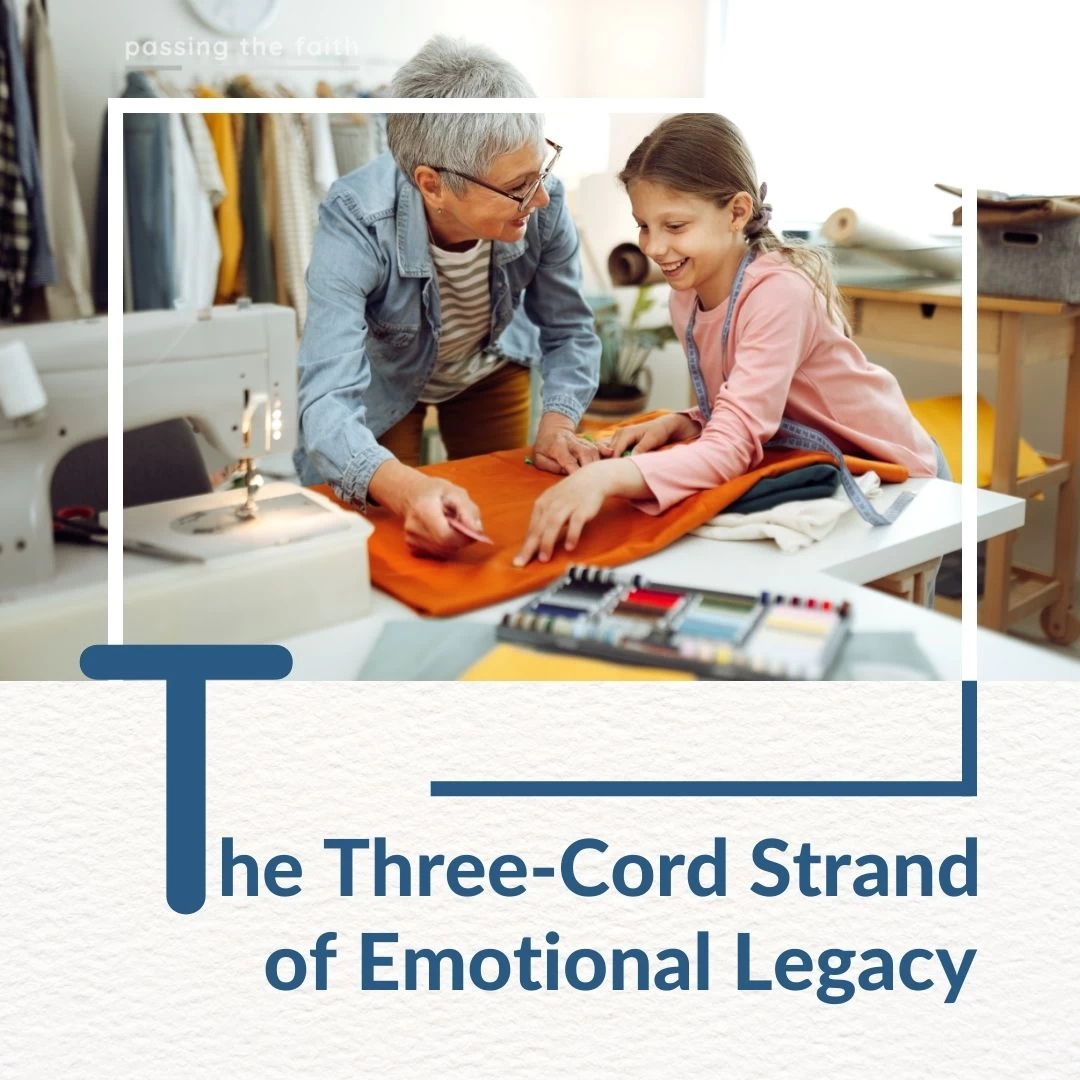Recently, we’ve been exploring the topic of heritage. Recall that we first examined the meaning of two words that are often used interchangeably – heritage and legacy. We discovered that while the words are similar, each has a distinct meaning. A heritage is something one receives. A legacy is something one leaves.
Further in our exploration, we learned that everyone has a heritage, and each heritage is made of three components. Additionally, we discovered that these components, spiritual, emotional, and social, are intricately woven together and inseparable creating a three-cord heritage. Yet, just like the meanings of heritage and legacy, each component is clearly distinct.
Having already surveyed the spiritual strand of our cord, this week we will look at the emotional strand.
The Emotional Strand
In their book, Your Heritage, J. Otis Ledbetter and Kurt Bruner define emotional legacy as “that enduring sense of security and emotional stability, nurtured in an environment of safety and love.” In other words, a strong emotional legacy is something that will give our grandchildren healthy emotions that allow them to deal with the struggles of life in a positive way.
Additionally, the emotional component of the three-cord heritage works much like the stabilizer bar in a car. The emotions act to stabilize the spiritual and social elements.
A Closer Look
First, a solid emotional legacy is nurtured. It is not something that can be built quickly. The process of building a solid emotional legacy takes much time and consistency as we work to create an atmosphere that surrounds our grandchild’s fragile spirit with the nourishment required for healthy growth.
Second, an emotional legacy endures. Just as it is not quickly developed, it is not quickly forgotten. A strong emotional legacy typically lasts through the adult years.
Third, this healthy emotional strand provides security and stability which, of course, has been cultivated in an environment of love and safety. More than with the other strands – spiritual and social – the environment and tone of family life directly influence the outcome of a person’s emotional self. An atmosphere of love nourishes emotional stability which is the capacity to cope with failure and pain. An atmosphere of safety provides fertile soil for the deep growth of security which emboldens the confidence to face an often harsh and cruel world.
Building the Legacy
As we work to intentionally and diligently build a legacy worth leaving, there are a few things we need to keep in mind when it comes to the emotional strand.
First, we must understand that the frequency of our interactions with our grandchildren makes a huge difference. Without frequent interaction it is impossible to build a quality relationship, and without a quality relationship it is impossible to build a healthy emotional legacy. Spend as much time as possible interacting with your grandchildren. Attend their activities, schedule face-to-face visits, write letters, make phone calls, send text messages. Do what it takes.
Second, it is essential that we comprehend the impact of our relationship with our grandchildren’s parents. It is one of the most important factors when it comes to our relationship with our grandchildren. By God’s design, parents are the gatekeepers of their children. They grant access, or they restrict it. Intimacy with our adult children paves the way to intimacy with our grandchildren. Not surprisingly, a strained relationship with adult children negatively impacts our interactions with our grandchildren. If your relationship with your adult children is strained, here are four things you can do to help develop and maintain a better relationship.
- Pay attention to the words you speak to and about your adult children.
- Pay attention to your feelings about your adult children. These feelings are often transmitted to your grandchildren.
- Pay attention to your expectations. You have expectations about your relationship with your grandchildren. Your adult children have expectations about their relationship with their children. Learn to hold your expectations loosely and discuss them with each other.
- Pray. Sadly, some relationships are strained to the point that the previous tips aren’t even an option. You’ve been cut off. May I encourage you not to lose hope? Your adult children can refuse to see you. They can prohibit you from seeing your grandchildren. But… they cannot keep you from praying!
Third, grasp the importance of being a safe place. Yes, your grandchildren need your wisdom. But more than that, they need your assurance. They need to know without a doubt that you are a safe place. Learn to listen well – without judging, preaching, or shaming. And learn to speak well – words of encouragement, affirmation, and blessing.
A Strong Spiritual Legacy
Before we wrap up our look at the emotional strand, I think it might be helpful to share a few ideas for how you can more effectively work to build this strand of the three-cord heritage.
- Provide your grandchildren with a safe environment in which deep emotional roots can grow.
- Surround them with an atmosphere of love nourishing stability and fostering confidence.
- Cultivate a tone of trusting support.
- Nurture a strong sense of positive identity (Christian and familial).
- Create space for your grandchild’s soul to be nourished and rested.
- Demonstrate unconditional love.
Our grandchildren are going to face struggles. They are going to experience failure and pain. In other words, they will take emotional hits as part of living and growing.
We can help them better cope with these inevitable hits by providing them with a strong heritage. The stabilizing component of which is the emotional strand.










